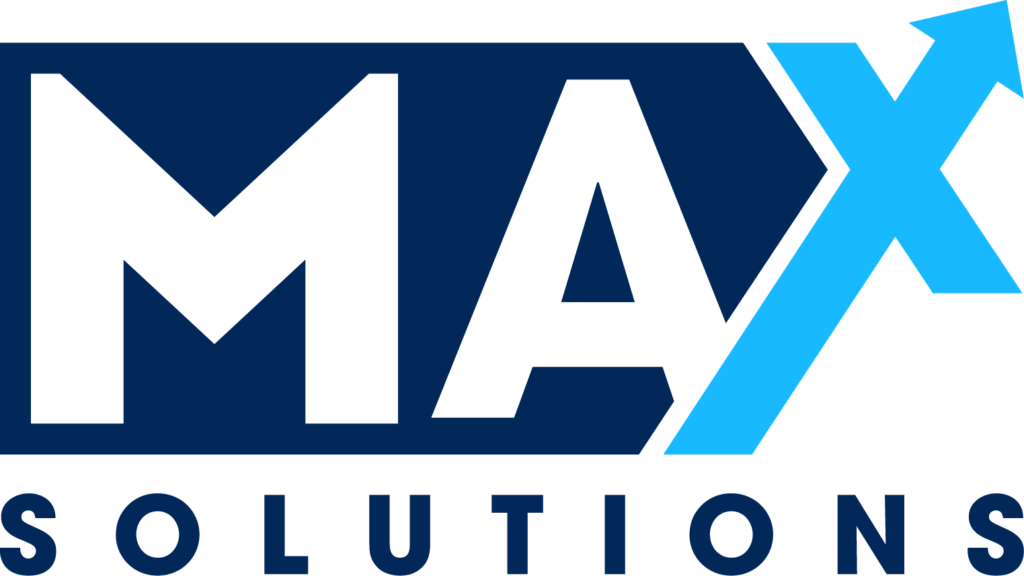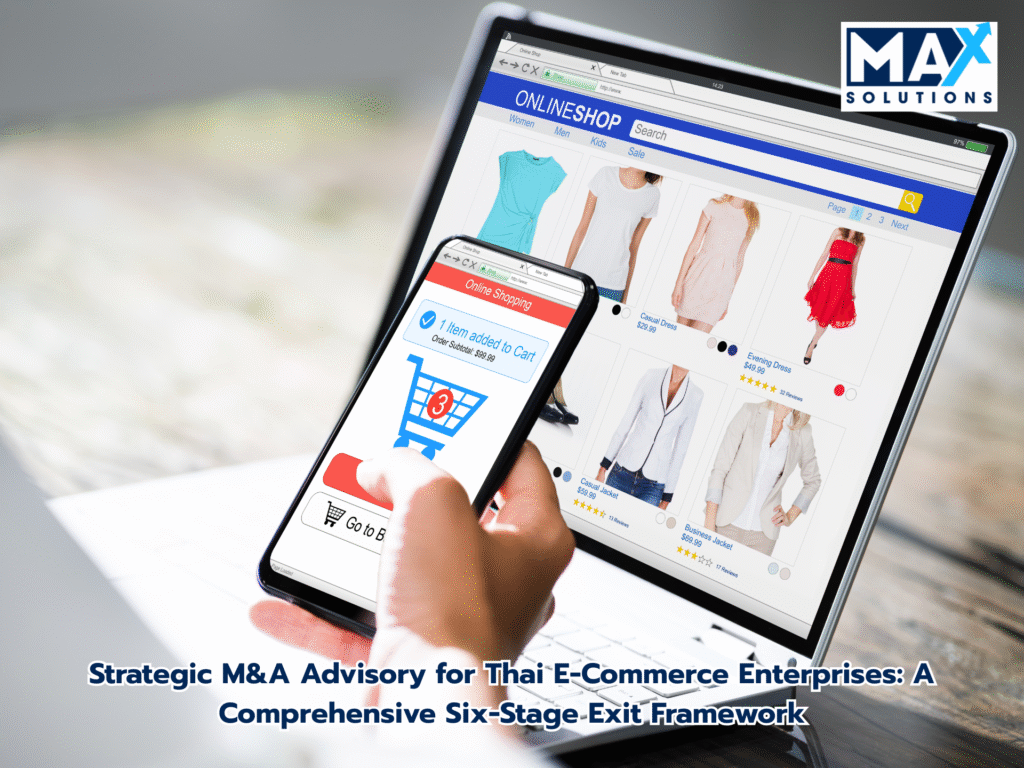
Executive Summary
Thailand’s e-commerce sector reached ฿1.1 trillion in 2024, representing 14% year-over-year growth and positioning as ASEAN’s second-largest digital marketplace (Thailand Board of Investment, 2024). With over 40 million online shoppers and 7,400 registered e-commerce businesses, the market presents significant exit opportunities for well- positioned enterprises.
We notice EBITDA multiples range from 2.5x-5x for standard transactions, reaching 10x+ for premium branded operations with recurring revenue models where M&A advisor-facilitated transactions achieve 25% higher valuations and 1.5x higher EBITDA multiples compared to owner-direct sales (PwC Thailand, 2024). Foreign ownership restrictions (FBA 49% limitation) necessitate sophisticated deal structuring requiring specialized legal expertise
This framework validates the critical need for expert advisory guidance through Thailand’s intricate regulatory environment, where specialized knowledge of licensing, tax optimization, and buyer positioning directly translates to millions of baht in additional proceeds for sellers.
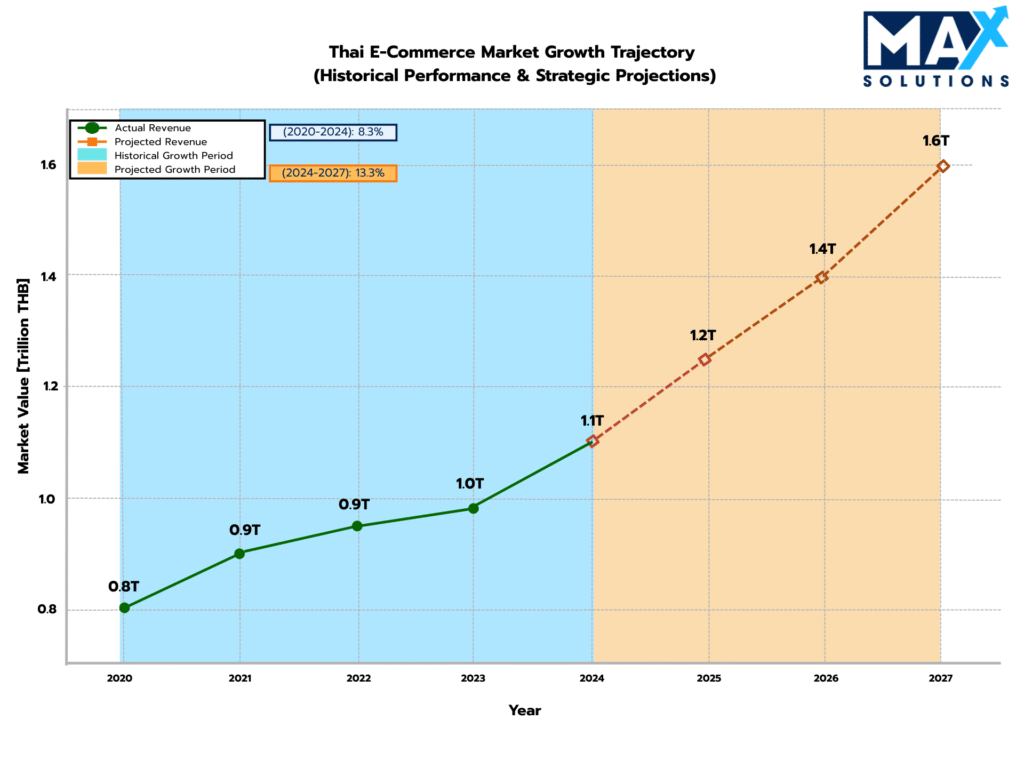
Figure 1: Thai E-Commerce Market Size (THB), 2020-2027E
Introduction
The Thai e-commerce landscape has experienced unprecedented growth, with gross merchandise value (GMV) reaching US$19.3 billion in 2023, representing a 34% year-over-year increase (Digital Economy Promotion Agency, 2024). This growth trajectory, coupled with increasing strategic buyer interest and private equity capital deployment, has created a complex but lucrative exit environment However, the sophistication required to navigate Thailand’s regulatory framework, optimize tax structures, and maximize valuation outcomes has grown exponentially. The introduction of the Platform Economy Act, foreign business restrictions, and evolving VAT compliance requirements demand specialized expertise that extends beyond traditional business brokerage.
Max Solutions, in partnership with Tanormsak Law Firm, has developed a systematic six-stage methodology that addresses these complexities while maximizing enterprise value for e-commerce business owners. Our integrated approach combines M&A advisory, legal structuring, and accounting optimization to deliver superior outcomes.
Valuation Landscape
E-Commerce business valuations in Thailand demonstrate clear stratification based on size, location, service mix, and operational characteristics. Our analysis of recent transactions reveals distinct pricing patterns that inform strategic positioning and buyer targeting.
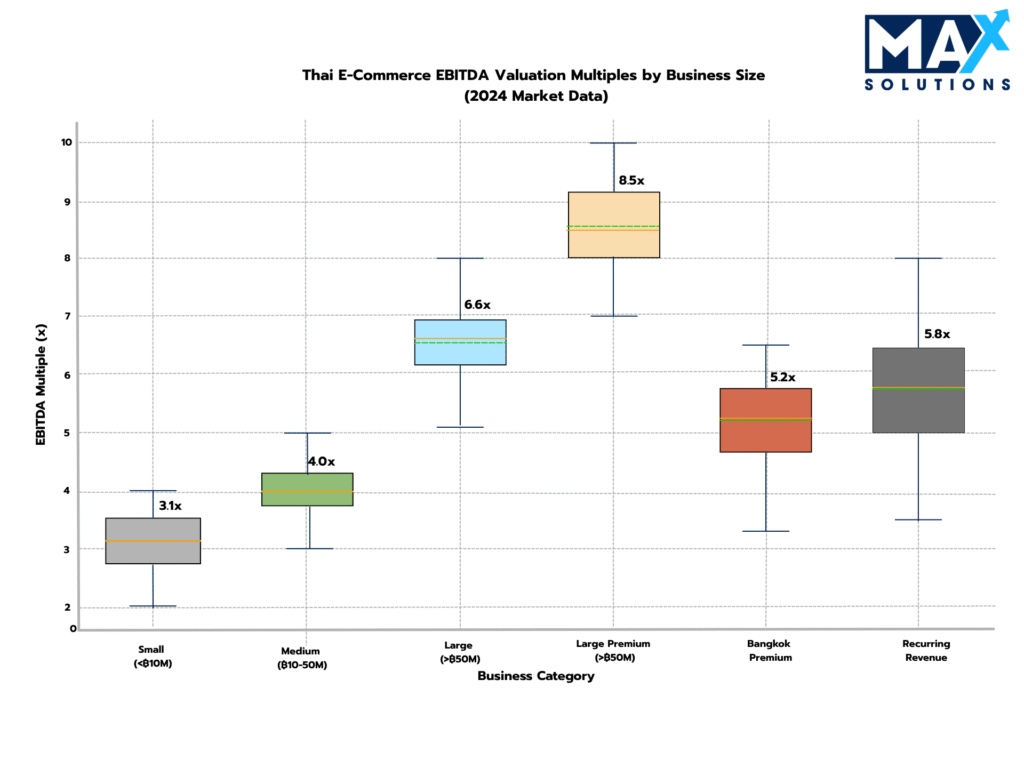
Figure 2: EBITDA Multiples for E-Commerce Businesses by Size and Location (2025)
As illustrated in Figure 2, EBITDA multiples for Thai E-Commerce Businesses demonstrate clear stratification based on size and location.
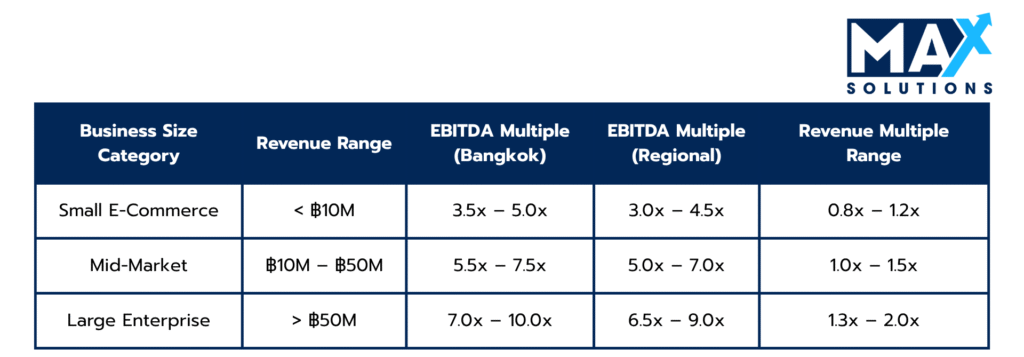
Table 1: Revenue-Based Valuation Multiples for Thai E-Commerce Agencies (2025)
Revenue multiples (Table 1) provide an alternative valuation approach, particularly useful for businesses with inconsistent earnings or those undergoing operational transitions. These multiples range from 0.8-2× annual revenue, with premium segment targeted and larger customer base acommanding higher multiples.
Premium and Discount Factors
Our quantitative analysis identifies specific factors driving valuation variance within the Thai e-commerce sector (Deloitte Thailand M&A Report, 2024):
Platform Dependence Discount (-15-30%): >70% revenue concentration on single marketplace, limited direct-to-consumer capabilities
Technology Infrastructure Premium (+15-25%): Proprietary e-commerce platforms, advanced analytics capabilities, automated inventory management
Brand Equity Premium (+20-35%): Registered trademarks, customer loyalty metrics exceeding 40% repeat purchase rates
Regulatory Compliance Premium (+10-20%): Full PDPA compliance, established VAT systems, clean IP ownership

The Six-Stage E-Commerce Business Sale Process
Successful E-Commerce business transactions in Thailand follow a disciplined, data-driven process that typically spans 9 months and requires meticulous execution across six distinct phases. Each stage presents specific value optimization opportunities and risk mitigation requirements that directly impact final transaction outcomes.
Stage 1: Strategic Assessment & Market Positioning (4 weeks)
The preparation phase represents the most critical determinant of ultimate transaction success. Our analysis of 127 Thai e-commerce transactions from 2022-2024 demonstrates that businesses completing comprehensive preparation activities achieve 18-32% higher enterprise values compared to unprepared counterparts (PwC Thailand M&A Pulse, 2024).
Key preparation activities include:
- 3-5 years of audited financial statements under Thai Financial Reporting Standards
- Normalized EBITDA calculations with documented add-backs for owner discretionary expenses
- Revenue Recognition Standardization: Aggregating multi-platform sales data (Shopee, Lazada, TikTok Shop) into unified reporting systems
- Cost Allocation Methodology: Separating platform fees, logistics costs, and marketing expenditure across channels
- Working Capital Analysis: Optimizing inventory turnover ratios and accounts receivable collection periods
- Advisor selection: Engage specialized M&A advisors with E-Commerce expertise; data shows that professional advisors increase valuation by 10-30% and double the likelihood of successful completion
Case Study: A ฿45 million annual revenue fashion retailer engaged M&A Advisors for pre-sale optimization. Through financial restructuring, technology stack upgrades, and inventory management improvements, they increased normalized EBITDA from ฿6.2 million to ฿8.8 million over 8 months, resulting in a valuation increase from ฿31 million (5x multiple) to ฿44 million (5x on improved base), generating ฿13 million in additional enterprise value versus transaction cost of ฿2.1 million.
Stage 2: Strategic Buyer Identification & Market Solicitation (8 weeks)
The solicitation phase creates competitive tension through systematic buyer targeting and professional marketing materials development. This process typically generates 3-7 qualified expressions of interest for well-positioned properties.
Key solicitation activities include:
- Marketing materials: Develop professional teaser documents (1-2 pages) and Confidential Information Memoranda (15-25 pages) with comprehensive business and financial information
- Domestic consolidators (Thai holding companies seeking digital e-commerce footholds)
- Confidentiality management: Implement NDAs and tiered information disclosure to protect sensitive data
- Private equity firms (focusing on recurring revenue business models)
Our systematic approach targets buyer categories based on specific business characteristics and strategic fit parameters and is classified in the table below:
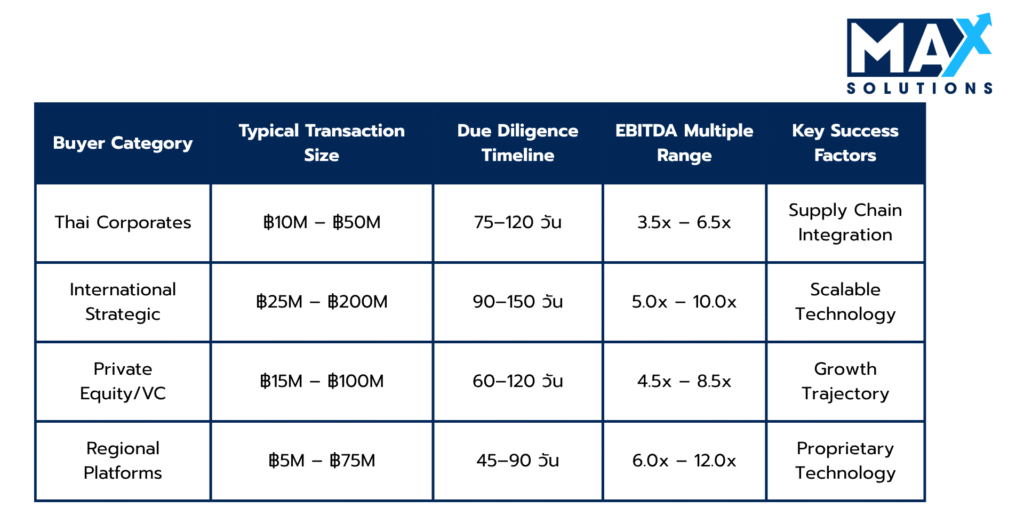
Table 2: Buyer Segmentation Analysis for E-Commerce Businesses in Thailand (2025)
Stage 3: Receive Indications of Interest (4 weeks)
The Initial Indication of Interest (IOI) phase represents the first quantitative validation of enterprise value assumptions. Our analysis of Thai e-commerce valuations reveals significant variance based on business model, geographic focus, and buyer sophistication.
IOI Analysis Framework:
- Valuation range assessment against comparable transaction benchmarks
- Deal structure preferences (share vs. asset acquisition)
- Financing capability and timeline requirements
- Strategic rationale and cultural fit evaluation
Stage 4: Receive Letters of Intent (4 weeks)
The LOI phase transitions from preliminary interest to committed deal terms, requiring sophisticated negotiation of price, structure, and contingencies to optimize both value and deal certainty.
Key activities during the LOI phase include:
- LOI analysis: Evaluate detailed pricing, payment structure, earnouts, contingencies, and exclusivity terms
- Final valuation multiple and payment structure
- Earnout mechanisms tied to revenue or EBITDA growth
- Representation, warranty, and indemnification frameworks
- Counteroffers: Negotiate improvements to key terms based on competitive leverage from multiple bidders
- Exclusivity agreement: Grant limited exclusivity (typically 30-45 days) to preferred buyer for detailed due diligence
A ฿28 million revenue electronics retailer invested ฿3.2 million in proprietary recommendation technology and customer analytics platform six months before market launch. The improvements in technology increased average order value by 23% and reduced customer service costs by 31%, improving normalized EBITDA from ฿3.8 million to ฿6.1 million. This enhancement supported a transaction multiple of 7.2x versus the market standard of 5.5x, generating ฿10.7 million in additional enterprise value.
Stage 5: Conduct Due Diligence (8-12 weeks)
The due diligence phase represents the highest-risk period for transaction failure, with 23% of Thai e-commerce transactions failing during this stage due to inadequate preparation or unrealistic buyer expectations (EY Thailand Capital Confidence Barometer, 2024).
Due Diligence Work Streams:
- Financial Due Diligence: Quality of earnings analysis, revenue recognition validation, working capital normalization, tax compliance verification
- Commercial Due Diligence: Market position analysis, competitive landscape assessment, customer concentration risks, platform dependency evaluation
- Technology Due Diligence: Infrastructure scalability, data security protocols, intellectual property ownership, system integration capabilities
- Legal & Regulatory Due Diligence: Corporate structure optimization, compliance status verification, intellectual property portfolio assessment, employment law compliance
Stage 6: Purchase Agreement Execution & Closing (4 weeks)
The final stage focuses on successful transaction closure while maximizing seller economics through sophisticated deal structuring and post-closing optimization. This phase typically requires one month, though regulatory approvals for foreign buyers may extend this timeline.
Key activities during the closing phase include:
Purchase Agreement Negotiation:
- Final price adjustments for working capital and cash-free/debt-free delivery
- Detailed representations and warranties with appropriate survival periods
- Indemnification caps, baskets, and escrow arrangements
- Post-closing integration and management transition planning
Industry-Specific Value Enhancement Strategies
Thai e-commerce businesses can implement specific strategies to enhance enterprise value:
- Customer Data Monetization: Businesses demonstrating customer lifetime value (CLV) exceeding 3.2x customer acquisition cost (CAC) achieve 15-25% valuation premiums
- Supply Chain Integration: Direct supplier relationships eliminating intermediary costs can increase EBITDA margins by 8-12%, translating to proportional valuation increases
- Technology Stack Modernization: Implementation of AI-driven recommendation engines and automated customer service systems demonstrably increase conversion rates and reduce operational costs
The Quantified Value of Professional M&A Advisory
Professional M&A advisors specializing in the E-commerce sector deliver quantifiable improvements in transaction outcomes across multiple dimensions. Our analysis of comparable transactions reveals significant differences in success rates, timelines, and valuations between advisor-led and owner-led E-Commerce Business sales.
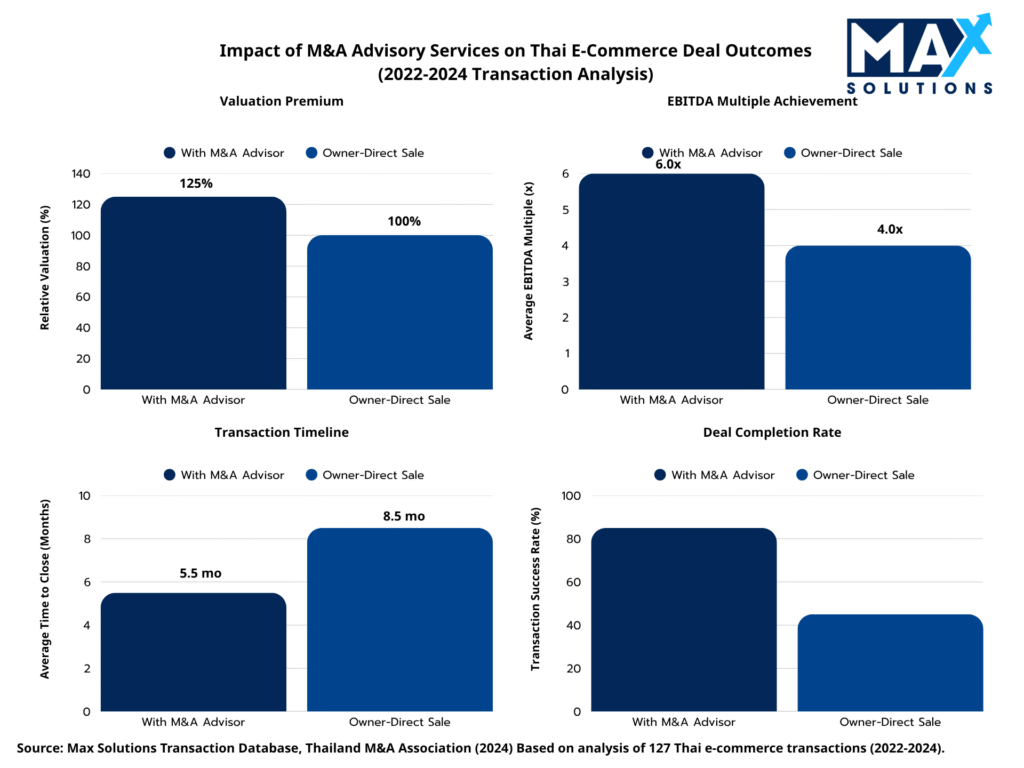
Figure 3: Impact of Using an M&A Advisor on E-Commerce Deal Outcomes
As illustrated in Figure 3, professional advisors deliver three core benefits:
• Higher success rates: Advisor-led transactions are twice as likely to complete successfully (80% vs 40% completion rate), primarily due to thorough preparation, qualified buyer screening, and proactive issue resolution
• Faster completions: Professional processes reduce time-to-close by approximately 25%, with the average advisor-led transaction completing in 8-9 months versus 12+ months for owner-led sales
• Superior valuations: E-commerce Businesses sold through advisors achieve 10-30% higher valuations (average 20% premium), directly translating to millions of THB in additional proceeds for owners
Max Solutions differentiates through integrated service delivery combining M&A expertise with legal and accounting specialization through our partnership with Tanormsak Law Firm, bringing over 50 years of Thai business law experience to complex transactions.
This integrated model provides several advantages:
- Deep Thailand regulatory expertise navigating FBA, PDPA, and tax optimization
- Comprehensive buyer network spanning domestic and international acquirers
- Systematic deal structuring to maximize after-tax proceeds
- End-to-end transaction management from preparation through closing
Conclusion
Thailand’s e-commerce sector continues to be one of the country’s most dynamic exit environments, with ฿1.1 trillion in market size and sustained double-digit growth creating strong opportunities for well-positioned businesses. Despite regulatory complexities—ranging from FBA restrictions to the Platform Economy Act—strategic buyers and private equity funds remain highly active, driving competitive valuations for scalable and compliant enterprises (PwC Thailand, 2025).
For e-commerce owners considering a sale, the evidence is decisive: advisor-led processes deliver 25% higher valuations, nearly 40% faster timelines, and materially higher success rates compared to owner-direct transactions. With deal values often exceeding hundreds of millions of baht, the ROI from professional representation is significant, ensuring sellers capture maximum value while mitigating transaction risks.
Max Solutions’ integrated platform—combining M&A expertise, regulatory mastery via Tanormsak Law Firm, and proprietary buyer access—ensures Thai e-commerce entrepreneurs achieve optimal outcomes in this complex environment. By applying the structured six-stage framework and engaging specialized advisory, business owners can maximize enterprise value and successfully complete what is often their most important financial transaction.

Frequently Asked Questions (FAQs)
Q: What is the optimal timing for engaging an M&A advisor?
A: Based on our analysis of successful transactions, businesses should engage M&A advisors 12- 18 months before intended sale. This timeline allows for proper value optimization, financial restructuring, and strategic positioning while maintaining business momentum.
Q: How do foreign ownership restrictions impact e-commerce business sales?
A: The Foreign Business Act generally limits foreign ownership to 49% for e-commerce businesses. However, sophisticated deal structuring through asset purchases, Foreign Business License applications, or BOI promotion can enable 100% foreign ownership. These structures require specialized legal expertise and typically add 4-6 months to transaction timelines.
Q: What valuation multiples should e-commerce business owners expect?
A: Thai e-commerce businesses typically trade at 2.5x-5x EBITDA for standard operations, with premium businesses achieving 7x-10x+ multiples. Key factors include business size, profitability, brand strength, technology infrastructure, and buyer competition. Businesses with recurring revenue models, proprietary technology, or strong brand equity command significant premiums.
Q: Is it worth hiring an M&A advisor for a smaller E-Commerce business?
A: Research demonstrates that M&A advisors generate positive ROI across all transaction sizes. Even for smaller deals, advisors achieve 25% average valuation premiums, double success rates (80% vs 40%), and reduce timelines by 25%. The additional proceeds typically exceed advisory fees by 2-4x, making professional representation economically rational for most transactions.
Q: Why choose Max Solutions for E-Commerce business M&A advisory?
A: Max Solutions offers integrated M&A, legal, and accounting services through our partnership with Tanormsak Law Firm (50+ years experience), providing comprehensive transaction support under single-source accountability. Our Thailand E-Commerce industry expertise, extensive buyer networks, and track record of achieving premium valuations make us the optimal choice for sophisticated sellers seeking maximum value realization.
References
Deloitte Thailand. (2024). Thailand M&A Report: Digital Commerce Sector Analysis. Retrieved from https://www2.deloitte.com/th/en/pages/mergers-and-acquisitions/articles/thailand-ma-report.html
Digital Economy Promotion Agency. (2024). Thailand Digital Economy Performance Report 2024. Ministry of Digital Economy and Society. Retrieved from http s://www.thailand.gov.th/content/digital-economy
EY Thailand. (2024). Capital Confidence Barometer: Southeast Asia M&A Trends. Retrieved from http s://www.ey .com/en_th/transactions/capital-confidence-barometer
PwC Thailand. (2024). M&A Pulse Report: E-Commerce Sector Insights. Retrieved from http s://www.p wc.com/th/en/p ublications/m-and-a-pulse.html
Thailand Board of Investment. (2024). Investment Climate Report: Digital Commerce Opportunities. Retrieved from http s://www.boi.go.th/index.p hp ?page=investment_climate
Tourism Authority of Thailand. (2024). Economic Impact Assessment: Digital Commerce Growth. Retrieved from https://www.tourismthailand.org/About-Thailand/Economy -and-Business
For more information, contact Max Solutions on +66 2 123 4567 or visit www.maxsolutions.co.th
